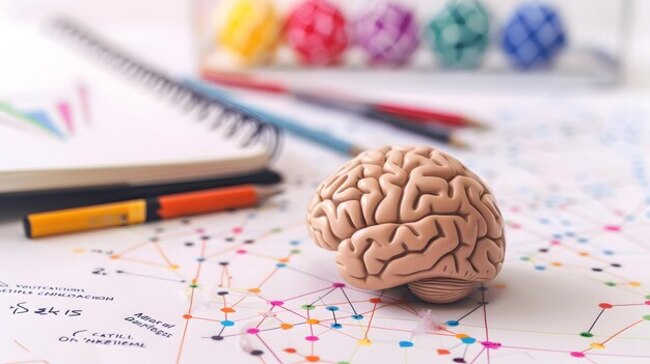The Role Of Neuropsychological Testing In Learning Disabilities
Understanding the intricacies of learning disabilities can often feel overwhelming. Neuropsychological testing offers critical insights, diagnosing challenges and informing tailored educational strategies.This guide delves into the importance of neuropsychological testing for learning disabilities, highlighting the processes involved, the benefits it offers, and what participants can expect. If you’re a parent, educator, or healthcare professional seeking to understand more about these evaluations, this article promises to equip you with the knowledge you need to support those affected effectively.

Understanding Complexities of Learning Disabilities
Learning disabilities stem from neurological conditions that impact how the brain handles incoming information, including processing, storing, and responding to different types of data. It’s important to understand that these disabilities do not reflect one’s intelligence or potential but rather indicate a unique manner of learning. Each type of learning disability affects different aspects of learning, impacting areas from reading and writing to math and the ability to focus.
Various learning disabilities include Dyslexia, which affects reading and language-based tasks, and Dyscalculia, known for impacting math skills. Early recognition and tailored support can significantly enhance educational and daily life outcomes for those affected.
Exploring Various Learning Disabilities
Dyslexia is one of the most recognized learning disabilities, significantly impacting an individual’s ability to read and comprehend text. Dyscalculia similarly affects how a person understands numbers and mathematical concepts.
Key Learning Disabilities Include:
- Dysgraphia: This disability influences handwriting and fine motor skills, often making writing tasks tedious and difficult.
- Auditory and Visual Processing Disorders: These are less commonly known but involve significant challenges in interpreting sounds and visual information.
- Nonverbal Learning Disabilities: These disabilities affect understanding nonverbal communication, such as facial expressions and body language, which can be hard to diagnose.
Each of these conditions presents unique challenges, yet they share the common trait of making certain aspects of learning more difficult. Recognizing and addressing these disabilities early can lead to tailored educational strategies that accommodate and support each individual’s needs, enhancing their ability to succeed and thrive in diverse settings.
How Learning Disabilities Shape Our Lives
Learning disabilities significantly influence various aspects of a person’s life, affecting not only academic achievements but also self-esteem. These challenges can extend to social interactions and everyday tasks, impacting how individuals engage with the world around them.
Challenges of Learning Disabilities:
- For instance, someone with dyslexia might find it difficult to read menus or interpret road signs, which can complicate seemingly straightforward activities.
- Without appropriate support, these difficulties can become barriers to personal and professional growth.
Fortunately, with targeted support and the right interventions, individuals with learning disabilities can excel. Neuropsychological testing is integral to this process as it pinpoints the specific hurdles each person faces. Understanding these challenges allows for the development of customized strategies, enabling those with learning disabilities to overcome obstacles and succeed in various aspects of their lives.

Understanding Neuropsychological Testing: A Personal Guide
Neuropsychological testing is a detailed assessment that examines an individual’s cognitive functioning, focusing on abilities like memory, attention, problem-solving, and language skills. This specialized process is crucial for identifying learning disabilities and pinpointing specific cognitive challenges that hinder learning.
Conducted by a neuropsychologist, this testing involves a variety of assessments to explore different cognitive abilities. The insights gained from these tests are instrumental in crafting individualized education plans (IEPs) and other targeted interventions. Not only do these evaluations help identify areas of difficulty, but they also highlight an individual’s strengths, providing a balanced view of their cognitive landscape.
Your Guide to the Neuropsychological Evaluation Process
The neuropsychological evaluation process is a thorough and detailed assessment that starts with an initial interview. In this initial stage, the neuropsychologist collects crucial information about the person’s medical, developmental, and educational history, setting the stage for tailored testing.
Key Steps in the Neuropsychological Evaluation:
- The individual takes a series of tests that evaluate various cognitive abilities.
- The testing session, often lengthy, may be divided into shorter segments to minimize fatigue.
- Following the tests, the neuropsychologist meticulously analyzes the data to craft a comprehensive report.
Once the testing phase is complete, the neuropsychologist finalizes a detailed report encompassing the test results, their interpretations, and specific recommendations for interventions. This personalized report is instrumental in designing effective strategies to address any identified cognitive challenges, helping individuals optimize their cognitive functioning.
Exploring the Various Tests Used in Neuropsychological Evaluations
Neuropsychological evaluations incorporate a diverse array of tests designed to measure different cognitive abilities. Each test focuses on a specific area of cognitive function, providing detailed insights into an individual’s mental capabilities.
Overview of Common Neuropsychological Tests:
- Memory Tests: These are aimed at assessing both short-term and long-term memory capabilities.
- Attention Tests: These focus on evaluating an individual’s ability to concentrate and maintain focus, useful in diagnosing conditions like ADHD.
- Language Tests: These measure verbal skills, including comprehension, expression, and the ability to follow directions.
- Executive Function Tests: These assess higher-order cognitive abilities such as problem-solving, planning, and organizational skills.
- Visual-Spatial Tests: These evaluate the ability to process and interpret visual information.
- Motor Function Tests: These measure coordination and fine motor skills, crucial for daily tasks.
These tests are critical in identifying various cognitive functions and potential impairments. Through detailed evaluation, neuropsychologists can tailor interventions that address specific areas of need, thereby supporting individuals in enhancing their cognitive performance and improving overall quality of life.

How Neuropsychological Testing Can Transform Learning Disability Management
Neuropsychological testing is vital in identifying learning disabilities, offering a comprehensive overview of an individual’s cognitive strengths and weaknesses. This enables educators to customize educational strategies to better meet each student’s needs.
This form of testing not only distinguishes between learning disabilities and other conditions, such as differentiating ADHD from specific learning disabilities, but also sheds light on a student’s unique learning style. Armed with this knowledge, educators can devise more effective teaching methods tailored to individual learning preferences. Overall, neuropsychological testing serves as an invaluable tool, significantly improving the support and opportunities available to those with learning disabilities.
Personalizing Educational Approaches
Neuropsychological testing is essential for developing personalized educational strategies, guiding the creation of individualized education plans (IEP) tailored to each student’s needs. This process ensures educational approaches are precisely aligned with a student’s cognitive profile.
Key Components of an IEP Informed by Neuropsychological Testing:
- An IEP is a formal document that specifies the educational accommodations and services provided to a student with a learning disability.
- Insights from neuropsychological testing can tailor these strategies, such as incorporating methods to enhance working memory if deficits are identified.
This targeted approach ensures that students with learning disabilities receive the precise support they need to thrive academically. By addressing specific cognitive deficits revealed through testing, educators can significantly improve educational outcomes for these students.
Prompt Action and Personalized Support
Neuropsychological testing is crucial for the early detection of learning disabilities, enabling timely and effective interventions. This early identification is vital as it significantly improves long-term outcomes.
Benefits of Early Intervention:
- Interventions can be implemented promptly, helping individuals develop compensatory strategies.
- These proactive measures can prevent secondary issues like low self-esteem or anxiety, which often accompany learning disabilities.
By facilitating early intervention, neuropsychological testing becomes a crucial tool in significantly improving the lives of individuals with learning disabilities. This proactive approach not only addresses immediate challenges but also sets a foundation for long-term success and well-being.

Addressing Challenges and Key Considerations in Neuropsychological Testing
Neuropsychological testing is crucial but complex, requiring precise administration and tailored interpretation. Ensuring accuracy is vital, as tests must be adapted to each individual’s unique characteristics.
While neuropsychological testing provides valuable insights, it’s essential to view it as part of a broader assessment strategy. It should be complemented with other methods to build a full understanding of an individual’s capabilities and needs, ensuring a holistic approach to assessment and intervention.
Addressing Cultural and Linguistic Differences
Cultural and linguistic appropriateness is essential in neuropsychological testing to ensure accurate assessment. Tests must align with the individual’s background to truly reflect their cognitive abilities.
Key Considerations for Cultural and Linguistic Alignment:
- Tests designed for native English speakers may not be suitable for those who speak English as a second language, potentially skewing results.
- Neuropsychologists must select tests that are sensitive to the cultural and linguistic contexts of the individuals assessed.
By paying close attention to these factors, neuropsychologists can provide more accurate and meaningful assessments, ensuring that tests measure true cognitive abilities without cultural or linguistic bias. This approach helps in crafting interventions that are genuinely effective in addressing the individual’s specific needs.
How Technology Enhances Neuropsychological Testing
Technology is revolutionizing neuropsychological testing, enhancing both efficiency and accuracy with digital tools. These advancements streamline the process, benefiting clinicians and clients alike.
Advantages of Digital Tools in Neuropsychological Testing:
- Immediate Scoring: Computerized tests offer instant results, saving time and minimizing human error.
- Engaging Testing Experience: Digital formats can captivate the individual’s attention better, ensuring active participation throughout the testing process.
These technological improvements not only make the process quicker and less prone to mistakes but also increase engagement, which is crucial for obtaining accurate results. By integrating these tools, neuropsychologists can provide more precise assessments and tailor interventions more effectively.
Shaping the Future of Neuropsychological Testing for Learning Disabilities
The field of neuropsychological testing is rapidly advancing, driven by deeper insights into the brain and learning disabilities. This progress enhances our capabilities to diagnose and assess these conditions effectively.
Key Advances in Neuropsychological Testing:
- New Technologies: Innovations in testing methods are becoming more precise and efficient.
- Research Breakthroughs: Ongoing studies offer promising techniques that can significantly improve outcomes for individuals with learning disabilities.
Despite these technological and research advancements, the effectiveness of neuropsychological testing ultimately depends on the expertise of the professionals administering these tests. It’s essential that they skillfully apply these tools to truly benefit individuals with learning disabilities.
Progress and Innovations in Research
Research fuels advancements in neuropsychological testing, with ongoing discoveries providing deeper insights into brain functionality and learning disabilities. These insights are crucial for developing more accurate and effective diagnostic tools.
Recent Developments in Neuropsychological Testing:
- Innovative Tests: New tests and methodologies are being developed based on the latest research.
- Brain Imaging Techniques: These are being explored to gain a more detailed understanding of brain function, enhancing diagnostic precision.
While these advancements are promising, the process of research is meticulous and gradual. It requires time to fully grasp these breakthroughs and effectively integrate them into practical neuropsychological testing approaches.
How Neuropsychological Testing Influences Education and Policy Decisions
Neuropsychological testing significantly shapes educational and policy decisions by informing the necessary accommodations and interventions. These tests help determine how resources are allocated to support diverse learning needs effectively.
Impact of Neuropsychological Testing on Education:
- Eligibility for Special Services: Students identified with learning disabilities through testing may qualify for special education services, which are tailored to help them thrive academically.
- Support Allocation: The insights from the tests determine how resources and support are distributed, ensuring students receive the necessary help to succeed.
Additionally, the data gathered from neuropsychological testing are invaluable to policymakers. These insights drive the creation of policies that aim to enhance educational outcomes for students with learning disabilities, ensuring that interventions are both effective and appropriately targeted.
Conclusion
Neuropsychological testing is crucial for comprehensively understanding and addressing learning disabilities. By evaluating an individual’s cognitive abilities, it highlights both strengths and challenges, providing essential insights for tailored support.
These insights are key to developing personalized educational strategies and interventions, enabling individuals with learning disabilities to grasp their unique learning profiles and advocate for their needs effectively. Ultimately, neuropsychological testing does more than diagnose; it empowers individuals to achieve their full potential and paves the way for their success in understanding, acceptance, and personal growth.
Frequently Asked Questions
Q: What age should neuropsychological testing be considered for a child suspected of having learning disabilities?
A: Neuropsychological testing can be considered as early as preschool years, especially if there are noticeable delays in developmental milestones or concerns raised by parents, teachers, or health care providers.
Q: How often should neuropsychological assessments be repeated for individuals with learning disabilities?
A: Re-assessment is typically recommended every 2-3 years or when a significant change in the individual’s educational setting or learning demands occurs, to ensure that current educational plans remain appropriate.
Q: Can neuropsychological testing help adults with learning disabilities?
A: Yes, neuropsychological testing can be valuable for adults as well, helping to identify learning disabilities that may not have been diagnosed in childhood and providing guidance for accommodations in higher education and workplaces.
Q: Are there specific neuropsychological tests that are more effective for certain types of learning disabilities?
A: Yes, different tests may target specific cognitive functions and may be more suitable depending on the nature of the learning disability. For instance, certain tests are better suited for diagnosing dyslexia or dyscalculia based on the skills they assess such as reading, writing, or numerical processing.
Q: How can results from neuropsychological testing influence treatment options for learning disabilities?
A: Results can guide the development of targeted educational and behavioral interventions, inform decisions about the need for special education services, and help refine strategies to support the individual’s learning, such as through the use of technology, tailored tutoring, or therapy.

